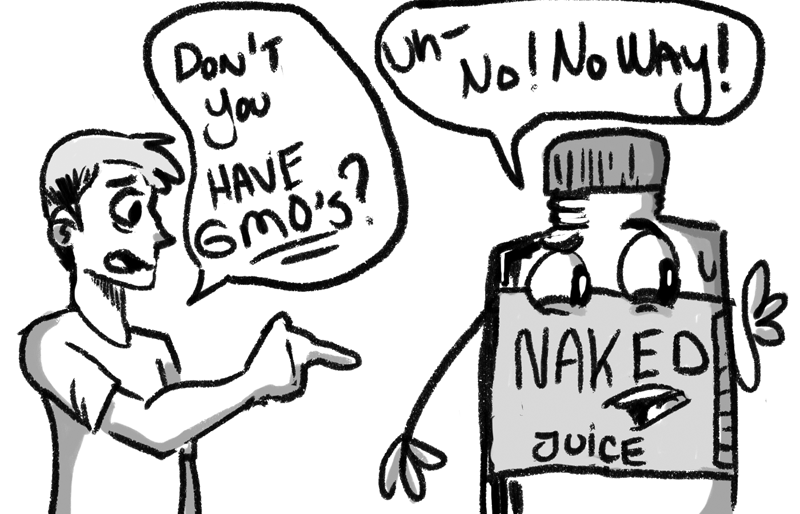Not all superfood smoothies are created equal. Naked Juice, a line of fruit and vegetable drinks owned by PepsiCo, is under fire for knowingly using genetically modified organisms (GMOs), while still advertising their products as “all natural” and “GMO-free,” according to a lawsuit filed in U.S. District court for the Central District of California.
The company has since taken phrases such as “all natural” off of their labels, but not without facing a $9 million dollar class action lawsuit that entitles misinformed consumers to a cash reimbursement. Those who bought a Naked Juice product between Sep. 27, 2007 and Aug.19, 2013 are qualified to receive $75 with proof of purchase and up to $45 without, according to the stipulation of settlement. The last day to submit a claim is Dec. 17, 2013. Those who wish to file a claim may do so at NakedJuiceClass.com.
It takes around five minutes to complete and what kind of Emory student would pass up a fat $45 check from Pepsi? For a college student, $45 can be borderline life changing.
The lawsuit against Naked Juice alleges that the products have non-natural ingredients such as genetically altered soy and synthetic fibers, according to plaintiff Natalie Pappas. While Naked Juice has continued to deny the accusations on their Facebook page, they have quietly removed the “All-Natural,” “100 percent Fruit” and “Non-GMO” labels from their products and agreed to a $9 million settlement, which seems odd.
Naked Juice is not the only company to meet harsh criticism for intentionally manipulating health-conscious consumers. According to the health-food and sustainability group EatDrinkBetter, companies such as Kashi, General Mills, Chobani and Kellogg, to name a few, are now facing ongoing lawsuits that claim some of their products have been falsely advertised as “natural.”
Even the rival of Naked Juice, Odwalla, which is owned by The Coca-Cola Company and sold in Cox Dining Hall, raises concerns. Odwalla started in the 1980s as a small band of individuals dedicated to making raw juices in California, but was acquired by Coca-Cola in 2001. We all know that huge multinational corporations are really good at two things: honest advertising and loyalty to a health-conscious, eco-friendly mission statement.
What I find most disappointing about the Naked Juice controversy is that, in the midst of the lawsuit, the company merely retracted their claims of being “all-natural,” without making any efforts to correct consumers’ fundamental issues with the drink. I expected, or at least hoped for a massive incentive to stock the juices with only natural ingredients in attempt to align with the brand’s original platform. Instead, Naked Juice merely redacted their pitch, which displays a complete lack of commitment to the values the company utilized to bolster, market and distinguish their product. Naked Juice does not care about the health of customers or the environment – all along, the mission of the company was to trick the public into thinking they were participating in a comparatively better manner of consumption by purchasing a product that destroys both their bodies and the environment relatively less than other products.
This reflects a larger issue at hand – the systematic aestheticization and exploitation of healthier and more environmentally conscious consumption. Given the movements towards “green consumption,” it is not surprising that some companies would profit off of the mere illusion of being “natural,” when in reality they are not concerned with eco-conscious production, organic farming, sustainability or the general health, wellbeing and trust of consumers.
Part of the problem also stems from the fact that the word “natural” has no clear meaning. In a statement on their website, the FDA explained, “from a food science perspective, it is difficult to define a food product that is ‘natural’ because the food has probably been processed and is no longer the product of the earth. That said, FDA has not developed a definition for use of the term natural or its derivatives. However, the agency has not objected to the use of the term if the food does not contain added color, artificial flavors or synthetic substances.”
Many companies, including PepsiCo, blame these cases of misinformation on the lack of regulation and terminological gray-area. However, I find it hard to fully acknowledge the company’s innocence. There is undoubtedly a deliberate use of ambiguous language, misleading claims and blatant deception to construct a brand that appears to be mindful of health and social and environmental issues. Obviously, the FDA should work hard to develop a concrete, applicable definition of the word “natural,” but companies should also not be pardoned for trying to manipulate the term’s significance to fit their product’s image.
So what should we, as Emory students, do about this? Young people should especially feel the sting of this marketing fraud; the conduct of companies like Pepsi undermine the efforts many students have taken to better themselves and the earth. For one – we should all get $45, whether we drink Naked Juice or not, because what could be better than flashing a squinty-eyed smile and holding your hands out as you receive a wad of cash from a huge corporate conglomerate?
We also should, in general, be hesitant towards products marketed as “natural” or “GMO free,” and with a minimal amount of research, refrain from buying the ones that have artificial ingredients.
But perhaps more decisive steps should be taken. The Odwalla refrigerator in Cox Hall feels like a kind of slap in the face, given the considerable damage these fabricated products have done to not only students’ supply of Dooley Dollars, but their health as well. It would be striking to see a student backlash against The Coca-Cola Company, along with a vigorous push to provide better, natural and more honest juice brands, such as Arden’s Garden – a proclaimed “purist” Atlanta-based business that prides itself on producing juices that are fresh, local, nourishing, reliable and not to mention, highly delicious.
There is absolutely nothing quite like chugging 15.2 fluid ounces of liquefied cucumbers, celery, apples, ginger, spinach and kale – especially after a night of rigorous, highly intensive consumption of drugs, alcohol or processed foods. But it is important to be meticulous in our responsibility, as students, to the environment and our bodies, and also our responsibility to be less oblivious, extravagant and impassive consumers. Health-conscious or not, no one wants to be played like the adorable, naïve, money-hurling little tree-hugger consumer that companies take us for.
The author’s name has been removed due to personal circumstances. If you have any questions about this decision, please email emorywheelexec@gmail.com.
Illustration by Mariana Hernandez
The Emory Wheel was founded in 1919 and is currently the only independent, student-run newspaper of Emory University. The Wheel publishes weekly on Wednesdays during the academic year, except during University holidays and scheduled publication intermissions.
The Wheel is financially and editorially independent from the University. All of its content is generated by the Wheel’s more than 100 student staff members and contributing writers, and its printing costs are covered by profits from self-generated advertising sales.






Hollywood star Will Smith is reportedly not returning to the sequel of his hit sci-fi film ‘Independence Day’. It is rumoured that the 45-year-old actor will not be reprising his role as Captain Steven Hiller in the sequel that has been titled ‘ID Forever